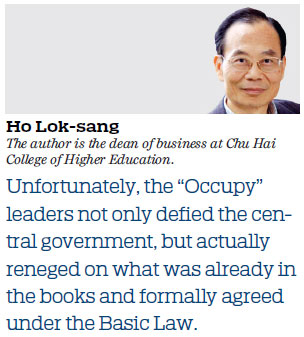Convictions, sentences attest to the rule of law
Updated: 2019-04-30 07:35
By Ho Lok-sang(HK Edition)
|
|||||||
Ho Lok-sang argues 'Occupy' ringleaders are not jailed for political views, but for breaking the law at the expense of public interests
Last week, eight of the nine key figures in the illegal "Occupy Central" protests in 2014 were given custodial or suspended jail sentences, as well as a community service order.
Depending on one's political stand, the sentences were disproportionately light or disproportionately harsh. But, far more important than the length of the sentences is the need to understand the rule of law, justice, and peace properly.
The leaders of the "Occupy" movement had tried to force the central and Hong Kong Special Administrative Region governments to adopt their version of nominating candidates for the post of Hong Kong's chief executive, demanding universal suffrage. "Occupy" was not meant to be an expression of a view, which could be done through ample avenues, like radio, the print media, television or pamphlets, but meant to be so lethal that the central and SAR governments were expected to be brought to their knees and agree to these demands.
The reason the activists gave for having to adopt such drastic action was that the central government had "failed to keep its promise of allowing Hong Kong people to elect their chief executive through the popular vote".

But, is this true?
Such a provision has already been enshrined in the Basic Law enacted in 1990 after years of consultations, and the provision was there to reassure the central government that election of the city's chief executive would be orderly and would not turn into a revolt against the central government. Article 45 of the Basic Law stipulates: "The method for selecting the Chief Executive shall be specified in the light of the actual situation in the Hong Kong Special Administrative Region and in accordance with the principle of gradual and orderly progress. The ultimate aim is the selection of the Chief Executive by universal suffrage upon nomination by a broadly representative nominating committee in accordance with democratic procedures."
The "selection of the Chief Executive by universal suffrage upon nomination by a broadly representative nominating committee in accordance with democratic procedures" is the "ultimate aim," which means that even in the long run, there has never been any promise on the part of the central government for anything like "civic nomination".
Unfortunately, the "Occupy" leaders not only defied the central government, but actually reneged on what was already in the books and formally agreed under the Basic Law. Is this justice?
In early 2014, the "Occupiers" had commissioned the Public Opinion Program at the University of Hong Kong to run a civil referendum on three proposals of procedures for electing the chief executive. The three proposals were screened out from many submitted to the platform set up by Benny Tai and others at the University of Hong Kong. Notwithstanding that 10 of these submissions were deemed acceptable by an international panel as complying with international standards, all three choices for citizens to vote upon allow citizens to directly nominate candidates, thus violating the requirement explicitly spelled out in Article 45.
If the "Occupy" leaders honestly believe that citizens are entitled to free choice and openness, how can they deny citizens' choices that are compliant with the Basic Law's requirement for a nominating committee? They are not only unjust - they are inconsistent or hypocritical.
The "Occupiers" called themselves "Occupy Central with Love and Peace". But, they only cared about what they wanted, and not what others wanted. Others wanted the choice to use the roads; and wanted it to comply with the Basic Law. Is caring only for their own demands at the expense of others' demands an act of love or peace?
Reverend Chu Yiu-ming told a radio program that the movement had got out of control, and that neither Benny Tai nor Chan Kin-man had intended to make the protests last that long. But, on various occasions, where I myself had joined discussions with Tai or Chan, I had challenged them that while they might have worked out a protocol for participants, the participants might not follow the protocol. "Things getting out of hand" had been an imminent possibility all along. One must not use that as an excuse to free one from the responsibility of setting up the groundwork for such an eventuality.
Even more disgusting to me is that some people are calling the jailed activists "political prisoners". They certainly know they are jailed not because of their political views, but because of their violating the law at the expense of the public's interests. They are entitled to have their views on what is the proper way to elect the chief executive. They can criticize the Basic Law and seek its amendment. But, working outside the law to impose their views on others and at the expense of the welfare of others is unlawful.
Some people asked why were the "Occupiers" charged with the common law crime of public nuisance instead of a statutory law crime. The common law crime of public nuisance elicits a much longer sentence than statutory law offenses. But, as Senior Counsel Ronny Tong Ka-wah observes, given the scale of the "Occupy" movement and the damage inflicted on the public, both of which are unprecedented in Hong Kong, both the charges and the sentences meted out are in line with the principle of proportionality. The convictions and sentences attest to the vigor of the rule of law in Hong Kong.
(HK Edition 04/30/2019 page9)